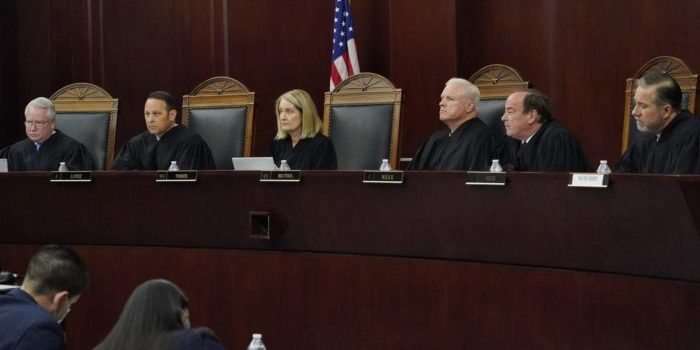The Arizona Supreme Court ruled in a 4-2 decision on Monday that the 1864 ban on abortion altogether will take effect in two weeks, instead of keeping a 2022 law that bans abortion after 15 weeks.
“Absent the federal constitutional abortion right, and because [the law] does not independently authorize abortion, there is no provision in federal or state law prohibiting [the law’s] operation,” the court’s majority opinion stated.
“Accordingly, [the 1864 law] is now enforceable,” it added.
The issue reopened similar questions to those raise by the U.S. Supreme Court in its Dobbs v. Jackson Womens Health decision regarding the authority of judges to determine such a crucial legislative matter
It also threatened to mobilize single-issue “AWFULs” (short for “affluent, white, female, urban liberals” or some variation thereof) in one of the most crucial battleground states ahead of the 2024 election.
Activists and left-wing operatives have already launched an effort at getting a ballot referendum on abortion added for the November election, as they have done or are seeking to do in several other states.
The initiative to grant abortion access until “fetal viability” into the Arizona constitution is expected to make it onto the ballot in November. The Center Square reported that the petition due July 1 has already received over 500,000 signatures, Arizona for Abortion Access estimates.
The current 1864 law includes an exception only when the mother’s life is at risk, which many abortion lovers say is typically too vague and restrictive.
“It is a dark day in Arizona,” far-left Gov. Katie Hobbs said at a news conference after the ruling dropped on Tuesday.
She is asking the legislature to scrap the law, even though she believes the 15-week ban is also too restrictive.
“We are 14 days away from this extreme ban from coming back to life. It must be repealed, immediately,” she said.
Meanwhile, leftists Attorney General Kris Mayes—who previously has signaled her refusal to enforce laws with which she disagreed—said her office was “looking at everything on the table available to us to fight this decision” including the possibility of appealing to the United States Supreme Court or a lower court.
The political toxicity surrounding abortion, which is largely believed to have informed Trump’s newly announced policy, compelled GOP senatorial candidate Kari Lake to reverse her past support of the court’s overturn of the 2022 law.
“Democrats are using abortion to win in ruby red and purple states,” noted Lake adviser Caroline Wren in an appearance on Steve Bannon’s WarRoom. “We lost in Alabama, Ohio, Kansas and Wisconsin to name a few.”
While many pro-lifers nonetheless celebrated the outcome, a handful of Republican voices in the legislature came out in support of repealing the 1864 law.
“I will immediately work with my legislative colleagues to repeal the territorial law so that the policy we placed in Statute, just two years ago, that places reasonable limitations on abortion that a majority of Arizonans support, can stand,” tweeted Sen. T.J. Shope, R-Coolidge.
Just a few years ago, when I voted to limit abortions to 15-Weeks (almost four months) in Arizona, I believed then, as I do now, that 15 weeks is what my district believes to be an appropriate timeline. Outreach from my constituents confirmed that to be the case. Today’s Arizona… pic.twitter.com/KIQ3mJBZJa
— T.J. Shope (@TJShope) April 9, 2024
The territorial-era law came back into play following the overturning of Roe v. Wade in June 2022, which brought the issue of abortion exclusively back to the states.
Months before the ruling, former Republican Gov. Doug Ducey signed the 15-week policy into law in an effort to stem the sort of last-minute disputes that other states where facing.
“I signed the 15-week law as Governor because it is thoughtful conservative policy, and an approach to this very sensitive issue that Arizonans can actually agree on,” Ducey tweeted.
I signed the 15-week law as Governor because it is thoughtful conservative policy, and an approach to this very sensitive issue that Arizonans can actually agree on. The ruling today is not the outcome I would have preferred, and I call on our elected leaders to heed the will of… https://t.co/h7n5bmYnrU
— Doug Ducey (@DougDucey) April 9, 2024
“The ruling today is not the outcome I would have preferred, and I call on our elected leaders to heed the will of the people and address this issue with a policy that is workable and reflective of our electorate,” Ducey added.
Alliance Defending Freedom, a socially conservative group that argued for making the territorial law enforceable, praised the ruling by the court.
“Arizona’s pro-life law has protected unborn children for over 100 years, and the people of Arizona, through their elected representatives, have repeatedly affirmed that law, including as recently as 2022,” ADF Senior Counsel Jake Warner said in a statement. “We celebrate the Arizona Supreme Court’s decision that allows the state’s pro-life law to again protect the lives of countless, innocent unborn children.”
Oral arguments in the case were made in October, making the decision a long-anticipated political wrench in the 2024 election cycle.
Headline USA’s Ben Sellers contributed to this report.

